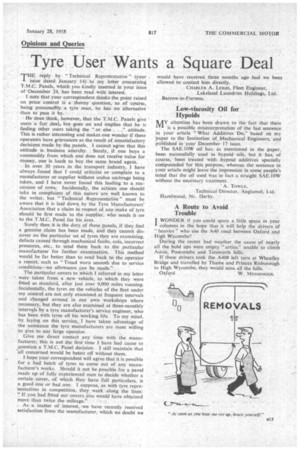Tyre User Wants a Square Deal
Page 41

If you've noticed an error in this article please click here to report it so we can fix it.
THE reply by "Technical Representative " (your issue dated January 14) to my letter concerning T.M.C. Panels, WhiCh you kindly inserted in your isue
of-December 24, has-been read with interest. .
I note that your correspOndent thinks the point raised on price control is' a thorny question, so of course, being presurnahly.-a tyre man, he has no alternative
than to pass it by.
He•does think, however, that the T.M.C. Panels .give users a fair deal? but -goes on and -implies that he is finding other users taking the 'or else . . ." attitude. This is rather interesting-and makes one wonder if these operators have grievances as the result of unsatisfactory decisions made by the panels, I cannot agree that this attitude is business anarchy. , Surely, if one buys a commodity from which one does not receive value for money, one is loath to buy the same brand again.
In over 30 years in the transport industry, I have always found that I could criticize or complain to a .
• manufacturer or supplier without undue umbrage being taken, and I have never found this leading to a succession of rows. Incidentally, the actions one should take in complaints of this nature are well known to the writer, but "Technical Representative" must be aware that it is laid down by the Tyre Manufacturers' Association that a claim in respect of any make of tyre should be first made to the supplier, who sends it on to the T.M.C. Panel for his area.
Surely then it is the duty of these panels, if they find a genuine claim has been made, and they cannot discover on the particular set of tyres they are examining, defects caused through mechanical faults, cuts, incorrect pressures, etc., to send them back to the particular manufacturer for further examination. This method would be far better than to send back to the operator a report, such as "Tread worn smooth due to service conditions—no allowance can be made."
The particular covers to which I referred in my letter were taken from a new vehicle, to which they were fitted as standard, after just over 9,000. miles running. Incidentally, the tyres on the vehicles of the fleet under my control are not only examined at frequent intervals and changed around in our own workshops where necessary, but they are also examined at three-monthly intervals by a tyre manufacturer's service engineer, who has been with tyres all his working life. To my mind. by laying on this service, I have taken advantage of the assistance the tyre manufacturers are most willing to give to any large operator.
Give me direct contact any time with the manufacturer; this is not the first time I have had cause to question a T.M.C. Panel decision. I still maintain that all concerned would be better off without them.
I hope your correspondent will agree that it is possible for a bad batch of tyres to come out of any manu facturer's works. Should it not be possible for a panel made up of fully experienced men to decide whether a certain cover, of which they have full particulars, is a good one or bad one. I suppose, as with tyre representatives in competition, they work along the lines: "If you had fitted our covers you would have obtained more than twice the mileage."
. As a matter of interest, -we have recently received satisfaction from the manufacturer, which no doubt we would have received three months ago had we been allowed to contact him directly.
CHARLES A. LEIGH, Fleet Engineer, Lakeland Laundries Holdings, Ltd. Barrow-in-Furness.
Low-viscosity Oil for Hypoids
!my attention has been drawn to the fact that there "1 is a possible misinterpretation of the last sentence 'in your article "What Additives Do," based on my 'paper to the Institution of Mechanical Engineers, and published in your December 17 issue.
The SAE.10W oil has, as mentioned in the paper, been successfully used in hypoid oils, but it has, of course, been treated with hypoid additives specially compounded for this purpose, whereas the sentence in your article might leave the impression in some people's mind that the oil used was in fact a straight SAE.10W without the necessary treatment.
A. TOWLE, Technical Director, Anglamol, Ltd. Hazelwood, Nr. Derby,
A Route to Avoid Trouble
WONDER if you could spare a little space in your columns in the hope that it will help the drivers of ' heavies " who use the A40 road between Oxford and High Wycombe?
During the recent bad weather the cause of nearly all the hold ups were empty " artics." unable to climb Aston, Postcombe and Tetsworth hills.
If these drivers took the A408 left turn at Wheatley Bridge and travelled by Thame and Princes Risborough to High Wycombe, they would miss all the hills.
Oxford W. MESSENGER.




















































































